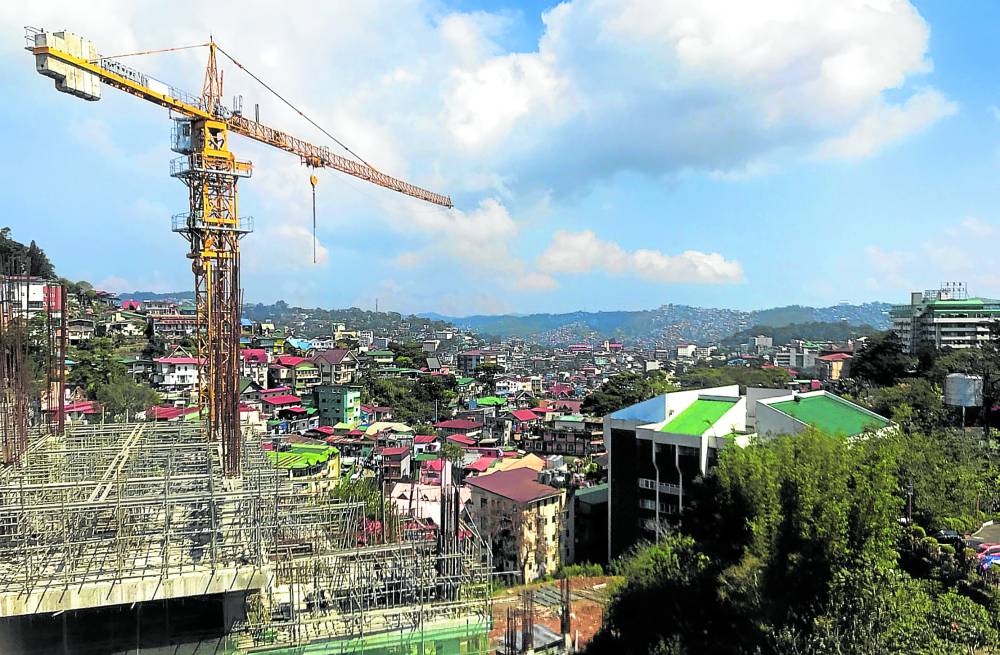
BUILDING BETTER The ease of travel, high vaccination performance and accessible tourism destinations helped improve public confidence so businesses and construction activities boomed in 2022 in Baguio City and throughout the Cordillera, as shown in this photo taken on Friday. Doing business in the summer capital might cost more if the proposed new tax code, seeking a 40-percent increase in taxes across the board by 2024, is approved. VINCENT CABREZA
BAGUIO CITY—Doing business in the summer capital might cost more after the city government’s executive department has proposed a 40-percent hike in business taxes and other related fees to help the local economy recover from the COVID-19 pandemic and to make up for the 22 years that it has not pursued a 10-percent tax hike allowed by law.
The draft revenue code, which is eyed to take effect in 2024, will replace City Tax Ordinance No. 2000-001, which has not been revised since 2001.
City Treasurer Alex Cabarrubias on Monday informed the city council that the increased rates are equivalent to the four times Baguio has failed to raise taxes within five-year cycles, which is mandated under Republic Act No. 7160, or the Local Government Code of 1991.
Remedy
Aside from the economic impact of the quarantines at the height of the pandemic in 2020 and 2021, Baguio government earnings have also “plateaued” and “stagnated,” requiring an overhaul of the city’s financial policies, Cabarrubias said.
The proposed new tax code was also designed to correct a distortion in the local tax classification system that has rendered the current tax law “regressive,” he informed the council.
“The lower your tax bracket is, the higher you pay [in certain segments of the Baguio tax table],” the treasurer pointed out, which the draft tax code intends to cure.
But while it has passed first reading, the city council on Monday returned the proposed 2024 Tax Code to the finance committee, suggesting a 20-percent tax increase instead.
Councilor Peter Fianza, a lawyer and chair of the committee on laws, said imposing a 40-percent tax hike may not be justifiable or “an act of justice” even if the city needs additional revenue.
If approved, the draft revenue code will raise P332.225 million for the city government from tax adjustments to be paid by 5,758 retailers, 700 wholesale retailers, 2,654 service providers, 158 manufacturers and 1,296 food service enterprises.
The increases will affect the taxes paid by 4,383 real estate lessors, 115 hotels, 403 banks and other lending facilities, eight cable television networks, and 161 amusement and recreational enterprises.
Administrative and operational fees will also rise, such as the mayor’s permit, which will go up to a fixed P3,000 from its current varying rates of P200 to P1,500.
Not for profit
According to Cabarrubias, the proposed revenue ordinance set the fees to approximate “cost recovery” of city government expenses and not meant to profit from taxpayers.
To date, Baguio’s gross collections represent only 70 percent of the revenues it earned in 2019, or before the pandemic struck, he said. That year, Baguio issued licenses to 18,657 businesses, which are presumed to have resumed full operations this year.
Remittances from the Baguio City Economic Zone (BCEZ) also dropped to P90 million in 2021, from P220 million in 2019, Cabarrubias added.
During the April 27 presentation of the 2022 Gross Regional Domestic Product of the Cordillera, export sales at the BCEZ improved by 4.35 percent last year, according to Monica Nikole Barrera, officer in charge division chief of the Philippine Economic Zone Authority.
She said exports rose to $1.132 billion in 2022 from $1.085 billion in 2021.
READ: Baguio business owners hit high taxes amid pandemic